Call of Duty: Vanguard Review
Call of Duty is like a scratched record that will not stop playing. And despite repeating the same tune, the audience keeps coming back every year. Occasionally the franchise skips to a new part of the same song and, momentarily, it is refreshed. But this year, Call of Duty: Vanguard jumps backwards to one you’ve heard many times before. Set during the Second World War, Vanguard was a chance for Sledgehammer Games to redo their uninspiring WWII title from 2017. It also addresses the lack of multiplayer content found in Black Ops Cold War at launch, by including far more maps. Despite the impressive online content and aggressive pace, this familiar song grates because of a disappointing zombies mode and another contrived campaign.

The campaign quality takes a nose dive compared to last year
Vanguard’s campaign begins in Hamburg, 1945, when a small team of allied soldiers infiltrate a train heading into enemy territory. The hodgepodge group consists of members from various allied nations: an American, a few Brits, a Russian, and an Australian. This unconventional squad seeks information about a mysterious Nazi operation called Project Phoenix. Unfortunately the group are captured, right as they’re about to find out what it is. Then the brutal actions of one Nazi officer are designed to both shock players and make said Nazi officer the main antagonist, in a story that lasts 5-6 hours but takes forever to get anywhere.
Because the team gets captured, the hunt for Project Phoenix grinds to a complete halt. You don’t find out what it is until the end, and the reveal is poorly done and clichéd. Almost the entire game takes place while the team languishes in prison, being tortured in succession, with long and dull pre-rendered cutscenes doing most of the narrative work. The real-world actors make the best of some trite dialogue, but none of the characters are likable due to excess hubris. Emotional attempts regularly fail because of inadequate setup or predictability. Even the humor must have fallen off the train during the introduction. As the group lingers in prison, the game consists nearly entirely of unrelated flashbacks; players assume control of each squad member in various battle scenarios across the globe.
The missions in Vanguard are an unfunny parody of previous Call of Duty games. There is not much that is new or done well, and most of the objectives are formulaic. You will have to kill groups of soldiers on mortars, destroy artillery guns on a coastline, and clear bunkers in the pacific with a flamethrower. As the Russian sniper, you will climb up walls that have conspicuous bits of yellow canvas on them, before crouch-running under desks like a limbo world champion. When you play as the cocky American, you will pilot a fighter plane and battle Japanese aircraft over the Pacific Ocean. But this, the game’s only vehicle sequence, is horrendous due to aiming that auto-centers and incoherent action. Even during a better mission, you must take down a circling aircraft with small-arms fire while a truckload of Nazi soldiers unloads its occupants nearby like it’s the last stop on a bus route.
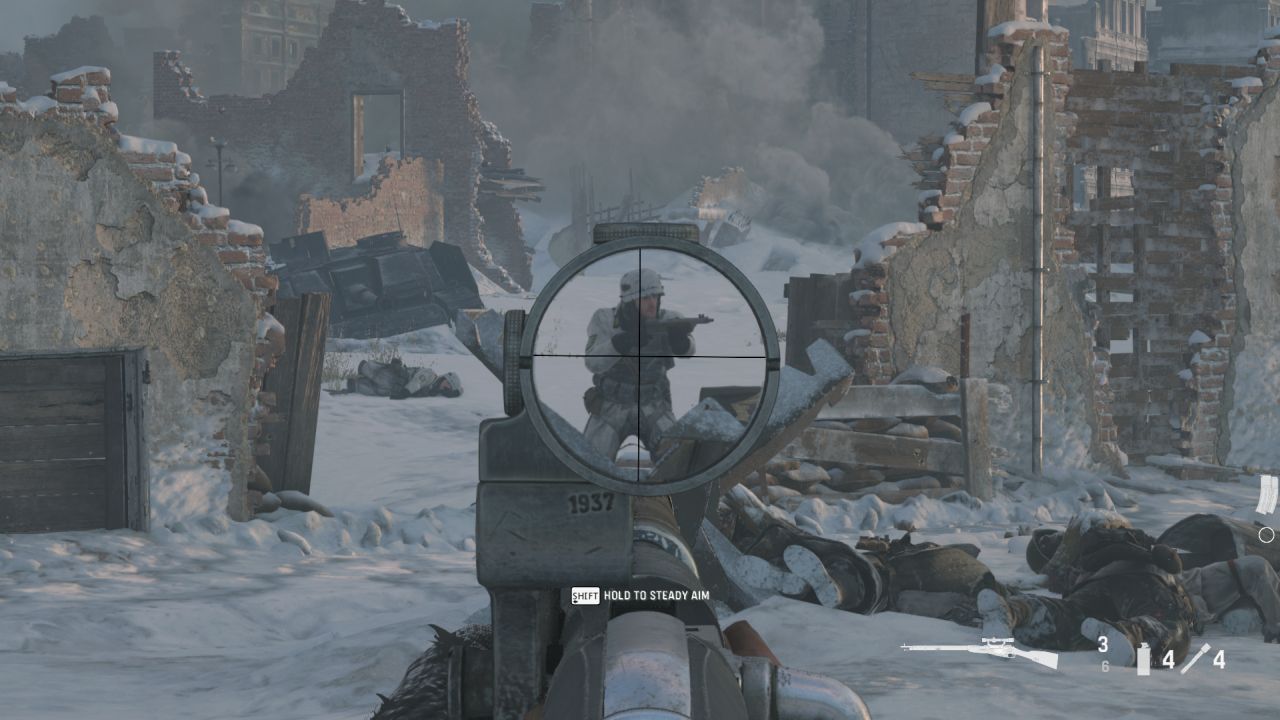
At least you get to snipe Nazis
The moment-to-moment shooting is decent but not without some issues. There is a good selection of reliable and familiar historic weapons, like the classic MP-40, Type 100 SMG, and M1 Garand. These feel good to shoot and there are plenty of bullets to unleash, thanks to a huge icon on the HUD that points out ammo caches. Clarity in combat is an ongoing issue. The game is a bit blurry, no matter what settings are used, and the levels sometimes abuse film grain which cannot be switched off. Muzzle flash effects (like smoke) and bouncing weapons (via recoil) tend to obscure whatever you are firing at. Also, many of the campaign missions feature minimal lighting, such as the intro train level—set at night—which made it hard to distinguish friend from foe and foe from cargo.
Call of Duty has never had smart AI, but careful scripting tricks were usually enough to hide their failings. There is no hiding from the obvious this time. One Japanese soldier took up position behind a truck and kept firing into it while I stood abreast and watched him reload. Another Nazi left cover, ran a circle around me, and jogged away without firing a shot. So often allies would run nonchalantly past a small group of enemy soldiers as though pretending what they do not see cannot hurt them. So Vanguard is a contender for the dumbest AI this year, in a campaign that is one of the worst in the series due to stale mission design and a poor story.
But if shooting dumb enemies is appealing, then Vanguard has a mode with zombies, called Der Anfang. The four-player cooperative mode is a mix of a traditional round-based setup with elements from the portal-jumping Outbreak mode that released for Cold War. Players start off in a dark Stalingrad square and can enter one of three portals to other maps/sub-areas and perform objectives that advance the game to the next round, increase the difficulty, and open up more of the starting area. Although the usual essence currency is given for killing zombies, it is not used to open new areas like in previous games. There are no fortifications to build either, as zombies merely teleport up out of the snow, which is annoying when they are the exploding type.
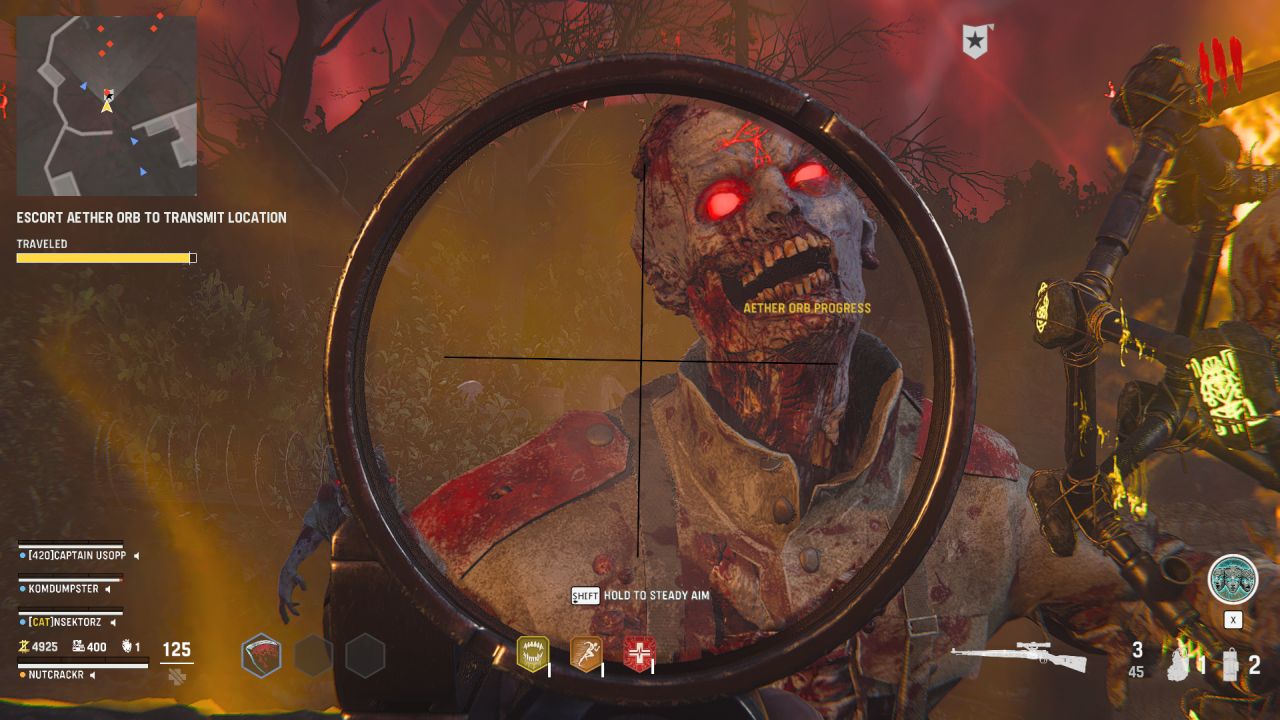
Zombies is not quite on target this year
The three objectives found through the portals get old fast. One requires the squad to merely survive a time limit in a small area. Another involves escorting a floating head from point A to point B, via the most indirect route. And the third is about charging a crystal with runes dropped from killed zombies. All objectives are monotonous, with too much downtime before and after the action. Once the objective is complete, the game teleports players back to the starting area—even if they’re already in part of the Stalingrad map. Zombies repopulate the main hub, along with some chests full of equipment that are protected by a zombie respawning train. But the hub area can be cleared, allowing players to restock, upgrade, buy random weapons, sacrifice hearts for special abilities, and drink perks at their leisure, ready to take the next portal and do it all over again.
The biggest thematic change to the undead mode is the injection of insufferable personalities. The four aether powers now have a voice. Not only will they remind you when you are ready to deploy a frost blast or energy mine, they will let you know when you, or your teammates, are surrounded. These symbiotic spirits, and the bad guys, also chat during objectives. It is ridiculous how much silly dialogue repeats in a short time span. When combined with the frequent quips from player characters and the angry grunts from the Nazi antagonist, the mode is better when the dialogue volume is set to zero. It is likely that Der Anfang will expand by linking more maps and objectives via the modular portal setup, but it is hard to say if this will be enticing given how plain it is now. Perhaps the best thing about Der Anfang is that weapon progression is shared with multiplayer, so any time spent with the undead is not dead time.
Multiplayer is the best part of Vanguard. The online play is closest to Modern Warfare 2019 but with faster action. It has MW2019’s compass for highlighting enemy fire, but an optional perk can put this information on the mini-map. Even though deaths are quick and there is weapon mounting on surfaces, most players move rather aggressively through levels thanks, in part, to the generous tactical sprint. The simple killstreak system returns, so that weird point method from Cold War will be a fading memory after you kill five foes to earn a satisfying glide bomb; interestingly some handheld killstreaks persist after death, like the ‘war machine’ grenade launcher, letting players use all of its ammunition across a few lives. Field upgrades provide the usual recharging benefits, such as a supply crate or jammer, plus there is also a fun remote-controlled mini-tank (minus the turret) that can squash people or explode. The weapon customization is excellent, with so many attachments and visual tweaks. It is rewarding to level-up guns and also necessary when the base versions struggle against players who have weapons with many unlocks.
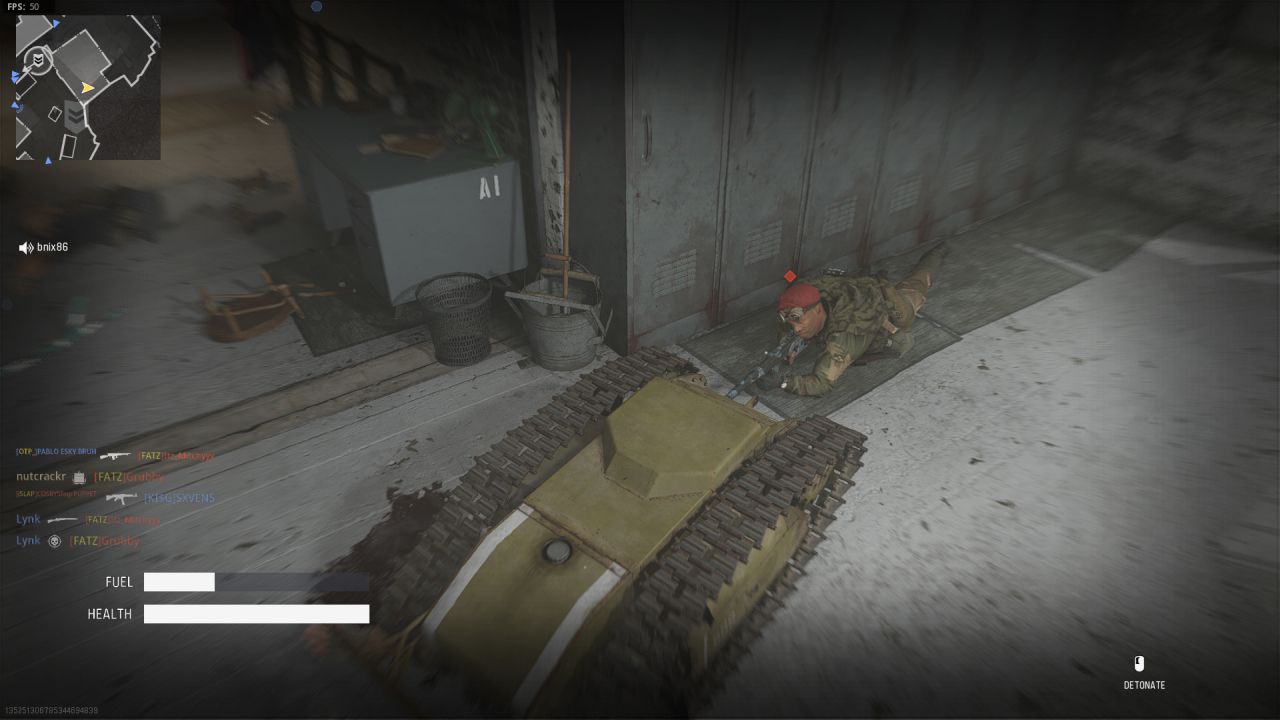
Using the goliath to squash people never gets old
Online matchmaking now gives players the ability to select a pacing level. There are three options—tactical, assault, and blitz—and these determine the action intensity via player counts. Tactical is like Call of Duty from years back, focusing mostly on 6v6 action. It provides ample combat and facilitates suspense because it lets players absorb the level’s atmosphere. Blitz turns every match into absolute chaos, with endless killstreaks and grenade spam. With sometimes twice the player count of tactical, it also breaks the already questionable spawn system. Choosing a pacing setting at either end of the scale will usually give players what they want, but assault is a crapshoot. Letting gamers decide how intense they want the action is a good idea, given how many enjoy the chaos of the small novelty maps, ala Shipment. It might put some in a tough spot when tactical is the most coherent and blitz is the quickest way to gain experience for weapons and operators.
In multiplayer you play as hero characters (aka operators), like the previous few games, and there are no gameplay differences between them. However, there are also no factions. All operators are on the same side; the Japanese and Nazi characters are called defectors in their respective cutscenes. So the battles are actually Allies vs. Allies, while the Nazis are off conquering Europe. This unhistorical decision is as dumb as the AI soldiers in the campaign, but it does not make a huge difference in combat. You shoot at anybody without a team icon over their head (or, conversely, with a red icon) and hope for the best. All operators have their own leveling system with custom quips and animations, which might keep players busy.
A bizarre feature associated with the operators is a new MVP voting screen that pops up after every single match. Three players on your team get a little custom Overwatch-style animation and everybody can vote for who got the best achievement (e.g. most time near enemies). This process wastes thirty seconds of your life, and it also means that play of the game is criminally short. One might suspect this showcase was done to sell skins and animations, so gamers could show off and feel rewarded, but eventually you will become numb to it.
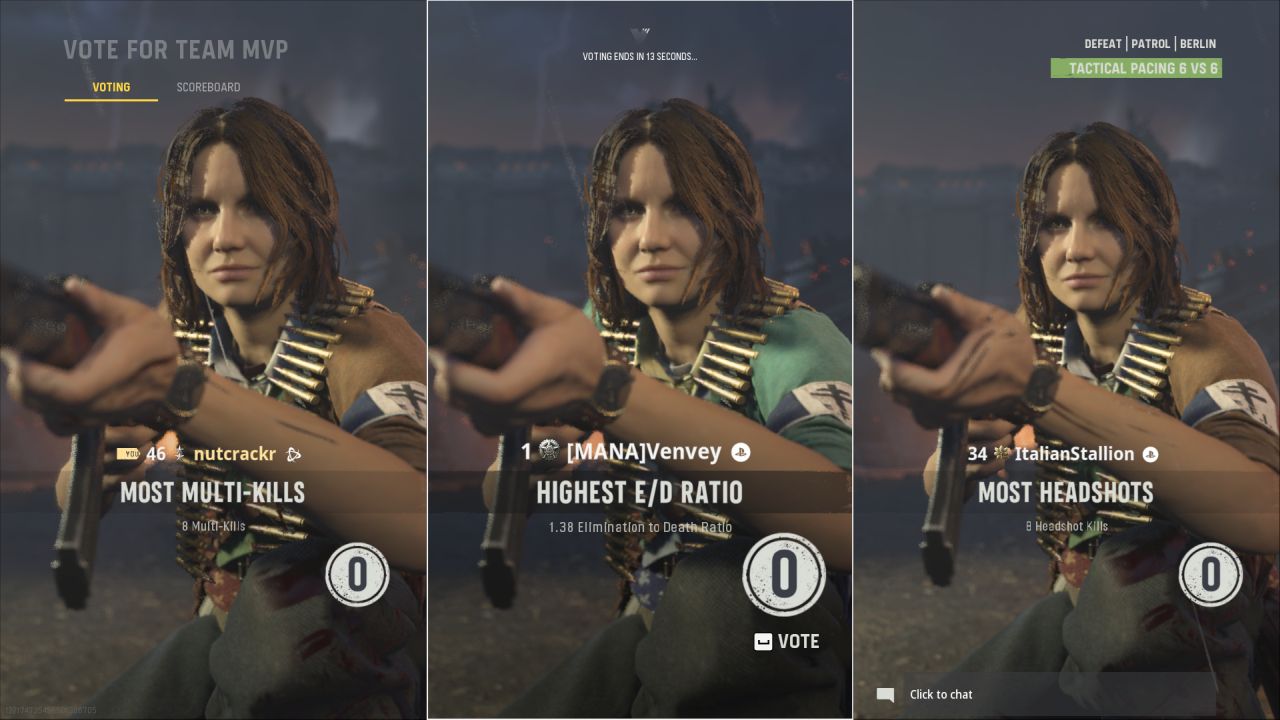
An annoying MVP vote happens after every match
Fortunately the map selection is solid this year. There are 16 maps to play on in the core multiplayer modes (TDM, FFA, Domination, S&D, Hardpoint, and Kill Confirmed) and this is twice that from last year. The only new mode for these standard maps is called Patrol, which is just a continually moving hardpoint that is difficult to hold and chaotic when it moves through buildings. Having lots of maps is smart. It does not matter too much when there are a few poor ones. There is no obvious trend for the good maps; the Tuscan map has good verticality and encounter variety, while the Eagle’s Nest map is a nicely balanced small combat space. Some maps are more suited to certain modes but generally the quality is above average. This large theatre of war does mean there is more variation in visual quality though; some look great, like Numa Numa, but others are dated despite having good structures.
Breakable wooden barriers are prevalent across most of the maps. These can be shot out, sprinted through, or punched down, creating new routes or exposing angles. Even regular doors splinter from bullets to leave tiny gaps in which to see enemies or incoming attack dogs. The Decoy map has more breakables than most, resulting in dramatic changes to sight lines as the match progresses. These breakables can lead to some surprising maneuvers, although most are just extra doorways to open or cover to avoid hiding behind.
Champion Hill is a new mode that almost makes you want to avoid confrontation. It is a tournament-style event that has two or three-player teams, but it takes place on a different set of tiny maps scattered with blobs of cover. Around eight teams enter a round-robin system and battle each other with the goal of retaining the lives allocated to them at the start. In between some rounds, players can buy gear, perks, and equipment. Weapons can also be upgraded on-the-fly. This small-scale mode is designed to appeal to those who hunger for intimate competition, but it does not seem to be that popular. And the long waits between rounds and bland combat spaces make Champion Hill a tough ask for just a few kills.
Vanguard is prone to a few glitches, both online and in the campaign. There are some annoying visual flickers with lights, textures, and shadows, but the biggest general cause is from the weird physics. In the campaign, bric-a-brac gets stuck after being jostled by a grenade. Online, on death, player ragdolls are awful and weapons spin away crazily. Even grenades bounce off cloth flags or invisible hitboxes that extend beyond the visual size of objects. Teammates are also real physical objects and they push you more than in previous games. Because some maps have narrow routes (like the horrible Sub Pens map) it makes for frustrating movement. The game runs pretty well on high settings, but it has unpredictable ‘packet burst’ issues that cause framerate stutters. There were also ‘server snapshot error’ disconnects, which are annoying when your team is in a winning position.
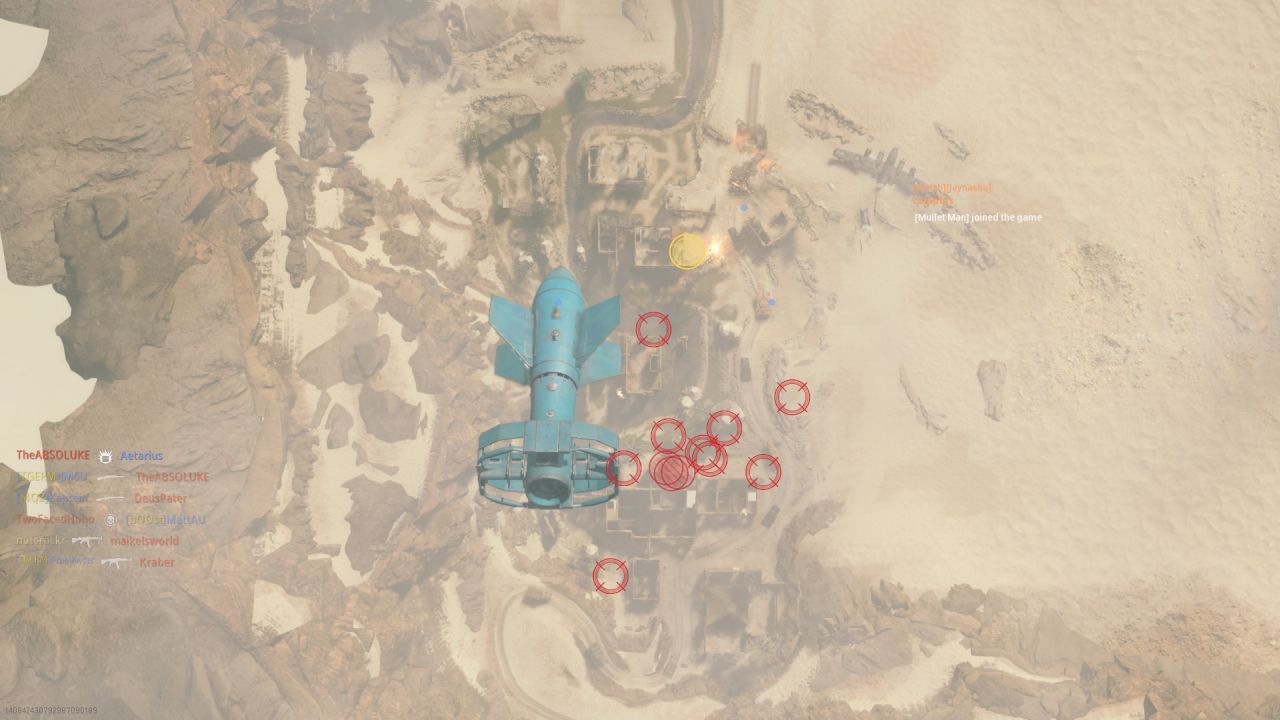
With a bit more polish, the multiplayer would be the bomb
Call of Duty: Vanguard stammers out the same old tune and finds itself in a similar position to the WWII game from four years ago. And while this year’s multiplayer effort is better than that game, the other two components are below the high notes set by the franchise. The campaign is contrived and uninteresting, with dumb AI and stale missions. And the barebones zombies mode gets boring fast, although it might improve as the game matures. Only the multiplayer is worth your time, even though it makes odd decisions with hero operators. Ultimately Vanguard’s numerous multiplayer maps, and allowance for gamers to find their own pace, will mean that most will find enjoyment as they fight amongst themselves.
